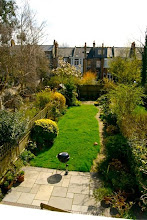The conversation ranged from the significance of ink blots and crossing-outs -- in Symington's letters and the Bronte manuscripts -- to the blurring of biography and fiction, which has also been discussed by several of you in the comments to my last post. Juxtabook, for example, has just asked 'why people have been more hot under the collar about [Daphne] than [Julian Barnes'] Arthur and George?' -- and it's a very good question, though I'm not sure of the answer. Certainly, what I've done in 'Daphne' has several precedents, which I mentioned on Thursday evening -- Colm Toibin's novel about Henry James, 'The Master', for example, as well as 'Arthur and George'. If I was feeling in a scratchily feminist mood, I might have answered Juxtabook's question by speculating that Julian Barnes and Colm Toibin are male novelists, writing about male authors, and that the hotness under the collars might have something to do with me being a woman, writing about Daphne du Maurier, who has often been (quite wrongly) dismissed as an insignificant writer of female romantic fiction.
But... I'm not sure if that would get me very far. And to be honest, the encouraging responses from readers who like my book -- and clearly understand what I'm trying to do -- are more than enough for me to not really mind about the people who don't approve. Sorry -- double negative -- but what I mean to say is that the positives outweigh the negatives. (It's unseemly to boast about good reviews, but suffice to say, they are very heartening. Kathryn Sutherland, for example, wrote in the TLS: "Discovering du Maurier where she set herself, at the insecure and fertile boundary between reality and fantasy, Justine Picardie has produced from these years and events her own remarkable mixture of biography, fiction and critical speculation. 'Daphne' is a literary mystery which borrows from and sheds light on the attested manipulation and dishonest treatment of the Bronte manuscripts by their curators and editors, Wise and Symington. It is also a study of loneliness, obsession and delusion that stretches from Haworth Parsonage in the 1830s to Hampstead in the present day, by way of the private madness and professional dealings of du Maurier and Symington in the late 1950s... ")
Of course, books elicit different responses from different readers, and I can't imagine writing a novel that would please everyone. Especially given the subject of 'Daphne' -- for it is, amongst other things, an exploration of the intensely powerful experience of reading, and also of misreadings; of how we can be haunted by fictional characters; and why a writer's version of 'the truth' isn't always the whole truth, and nothing but the truth.
I've just read Maylin's review of my book, and she summed it up far more succinctly than I've just done, with her comment that, "at its core the novel is really about the relationships and inevitable influences - obsessive, spooky, unconscious and yet necessary - between readers, writers and the written word."
I couldn't have put it better myself. Which just goes to prove the final point that I tried to make at Oxford: that as a writer, I hope that my book might be a beginning for someone else, rather than an ending in itself.









15 comments:
I can't be alone in finding myself now so steeped in Daphne's writing for the second time in my life and I know it may not have happened without your book Justine!I'm picking up all the books I've missed along the way too and haven't had such an absorbing reading project in ages. It's certainly to your credit that the book holds its own under scrutiny in all these places and at so many different levels.
Like DGR, I am becoming totally steeped in all things Daphne. I find myself talking about her to anyone I can keep still for more than five seconds, and I KNOW it is entirely down to having read your book, Justine!
One of the things that captured me the most was the mystery that snaked around the whole novel, which is something that Daphne uses to such great effect. You can feel Daphne and Symington starting to lose their grip on reality, and it's a powerful thing to have to deal with as a reader who therefore has no power to stop the events.
Thanks for both these comments. It sounds as if you two are feeling just as I did when I was researching and writing the book -- completely and utterly gripped by Daphne.
I think it's important to allow ourselves as "common readers" to indulge our imaginations and become obessesed with and engage with writing and writers with as much passion and credibility as any professional literary reviewer or academic. I recently gave up doing a PhD part-time as I just couldn't do it justice while working full-time. And while I was a bit sad about it at the time, I quickly realized that there's nothing to stop me from continuing to do research on my own, to have fun searching out obscure books on the topic in secondhand bookshops, to visit the haunts of the writers I would have written about etc. Literature is a conversation through the generations and through writing, whether a novel like Daphne, or the blogs we all indulge in and love to read. And I love discovering new links between writers and readers - it's all part of the adventure. I think the best compliment to your novel Justine is that it IS sending people back to du Maurier's work.
Here here Maylin.I realised studying had become an addiction and leapt straight into an MA after my OU degree thinking I couldn't live without it all. I gave up after the first module because I knew I'd got it wrong. Now I know I'm still studying and always will but just not writing anything that has to be given a grade. I think I also fancied that furry academic hood when I graduated but now I look at this picture of me and realise my mother had me in one years ago!
I couldn't agree more. I so enjoyed the research for Daphne -- and feel quite bereft without it now! Still, I'm hoping something else will come along to seize my imagination.
I've also been inspired to start rereading Daphne's books, and to start thinking again about the Brontes as a result of reading Daphne, which I think illustrates how powerful and moving it is.
I loved researching so much that I jumped straight into an MA, and promptly fell in love with Joyce Grenfell. In hindsight it may have been better to wait for some 'life experience' but the thrill of discovering things about her was more than worth it!
Reading 'Daphne' is kind of like doing the course again, because it has sent me in so many wonderful directions!
I think reading, at its best, can feel like the writer's hand has reached out to you, and taken hold of yours. Or it's like hearing a voice in the darkness -- or in Maylin's words, a conversation through the generations. Which is magical, isn't it? And the conversation that we're all having, through this medium,conjures up something similar, at moments like these, don't you think?
The fact that there are many people out there, who have read and understood your book creates this wonderful ability to share thoughts and feelings on it. It's almost like a world book group!
I really agree with the expression 'hearing a voice in the darkness' - it's how I feel when I find someone else who has the same response to a book I've loved. Truly magical and exciting!
Oh, I love the idea of the world book group!
I really do feel it - this ever spreading link with people who have responded to your book, and Daphne's works.
Also - talking of book groups has reminded me I need to read Lolita for 2nd June!
Well, Lolita will make a change from du Maurier; though I must say, "The Progress of Julius" -- Daphne's book which may or may not be about her father -- has Lolita-ish elements to it, though it is probably sacrilege to say so.
I found 'The Progress of Julius' in a secondhand shop over the weekend. Perhaps I'll read them together!
Perfect timing! I'd be interested to hear how the double-reading goes...
Post a Comment